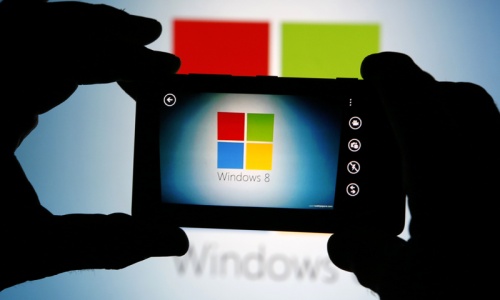In one of my previous posts, i suggested that Microsoft might be able to regain some relinquished ground in the mobile phone space if it mustered up the courage to bundle it’s Office productivity suite for free with every new windows phone device; the sole caveat being that it would involve cannibalization of one of it’s primary revenue drivers.
I considered this to be a necessary move since Microsoft is chasing the rest of the pack who seem to be running away with the market Microsoft once dominated, and arguably pioneered.
A curious thing happened the following week: Apple, the market leader did exactly that. At its iPhone 5C and 5S event, CEO Tim Cook took the stage and during the keynote announced that Apple’s entire productivity suite would be bundled in for free with every new iOS 7 device.
The suite that previously cost $4.99 to $49.99 depending on the selected apps would be available free. Apple has sold 170 million iPads to date and many, many more iPhones. Taking even the most conservative sales projections, Why would the market leader leave hundreds of millions on the table?
With iOS 7, Apple also launched the much-anticipated iTunes Radio and entered a market currently served by Pandora, Spotify, Rdio, Deezer, Last.fm, Xbox music and many others. Interestingly, industry insiders reported that Apple is paying more in music royalties per song/track than Pandora Radio has been for many years.
To make it more intriguing, Apple’s primary service offering is no different than Pandora in that it only allows skipping 6 tracks per hour per station, and it inserts ads, both video and audio, during each music stream. iTunes Radio is available on Apple TV while Pandora is available as a native app from many television manufacturers.
To remove ads from the Radio stream, Pandora charges $36 annually or $3/month. iTunes radio offers the same functionality for $24 annually or $2/month. Why would Apple pay a higher cost to offer an identical service, and then turnaround and sell it for less and intentionally lower its revenue in the process?
Microsoft used to charge customers a substantial amount every time it released a new version of its Windows operating system. The amount has historically been anywhere from $89 - $199 per license. Bucking the trend to make it’s value proposition a more enticing one, Apple has been charging between $19.99 - $29.99 for the past 3 versions of its OSX operating system.
This past summer TheNextWeb reported that 28 million copies of Mountain Lion, Apples previous operating system, had been sold and that constituted 38% of the Macs installed base.
A few days ago, Apple launched the next installment of OSX - titled Mavericks - and announced that it was going to remove price as a barrier and make it free. Lets think about that for a minute: If Mavericks garnered 25 million purchases at $19.99 each, that's half a billion dollars in lost revenue. Apple is still a publicly traded company and as such, is answerable to its shareholders. Why would Apple forego 500 million dollars?
Apple also lowered the price on its most popular models across its laptop portfolio by $200. Dropping prices, offering more, free software make the company in question sound like Amazon.
Known for it’s notoriously low profit margins, Amazon’s foray into hardware exists only to serve as a gateway for content; They don’t mind selling the devices close to cost as long as they can monetize them by selling content in the form of books, movies, music and apps.
A neophyte might say Apple is trying to emulate Amazon. A deluded ‘fanboy’ might say Apple is scared of Google and it’s growing presence. A cynic might say Apple doesn’t know what to do since Steve Jobs is no longer around.
The answer may lie in what Apple is currently not doing. For starters, it hasn’t made iCloud free nor has it given any indication that it might do so. Dropbox, Google and Amazon each have a substantial presence in this market.
By introducing a more compelling offering either in the form of more space or for free - similar to what Google did with Gmail ten years ago - Apple could get more of a foothold in the market. If giving the customer the best experience for free was the goal, they would have integrated iCloud in some way.
The second more important thing that they’re not doing is entering or ‘disrupting’ any new markets.
The media has been speculating about an Apple TV for what seems like eons now. Hiring senior management away from fashion powerhouses Yves Saint Laurent and Burberry fueled a frenzy that an iWatch is imminent.
The answers to these questions all point to one thing: Apple is using these tactics as customer acquisition and platform standardization experiments. Apple wants more people on iOS and OSX and is willing to take a financial hit to do so. However, Apple is a for-profit company, even if it has over 100 billion dollars in reserve, and given AAPL’s recent performance it needs to make inroads into new markets rather than preempt a price war for no particularly good reason.
I suspect Apple is going to enter the TV market but not before it can iron out a content strategy where the legal agreement terms aren’t onerous. The record labels still love Apple for saving the music industry from piracy and hate it for proclaiming it’s self as king in the process.
Rest assured, Hollywood doesn’t want to experience same fate, and given the influence that studios exert over cable companies and vice versa, it’s safe to say they don’t want to be sitting alongside the record labels of yesteryear wondering where all their power went.
If Apple can capture an even larger installed user base with ‘X’ amount of active credit cards in iTunes, and show increasing effectiveness of it’s iTunes Radio ad offerings all as a growing pattern, it can gain significant clout since it will command more power users.
If coupled with the acquisition of a still-independent network like AMC, Apple will have all the leverage it needs to enter the video production, relay and broadcast space.
The writer is a technology advisor and strategist.
Twitter Handle:@yasserbrohi















































